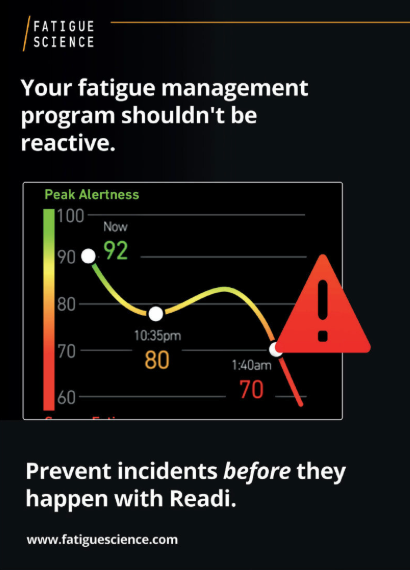Fatigue Science, the global leader in predictive fatigue analytics for mining, transportation and heavy industry, is pleased to announce the commercial launch of a breakthrough technology advance in its fatigue management platform. For the first time ever, customers can now obtain validated, personalized fatigue predictions for operators in their workforce, without requiring the use of wearables.
The technology, made possible by significant advances in Machine Learning and data science, enables a dramatic increase in the scale of operations that can benefit from predictive fatigue technology.
“Our fatigue management information system, Readi, has long been regarded as the world’s most credible solution for proactively managing and mitigating operator fatigue. We have long been delivering personalized fatigue predictions, known as ReadiScores, for operators who have worn wearables either daily or periodically. Today’s groundbreaking advancement is a huge step forward, addressing a longstanding request from customers,” says Andrew Morden, President & CEO of Fatigue Science. “With Machine Learning, we can now bring the safety- and productivity-enhancing benefits of predictive fatigue technology to a much wider array of customers who are not yet ready to adopt wearables.”
“The use of wearables has always been a competitive strength for us, generating an unrivaled dataset of over 4 million sleeps in industrial environments in over 95 countries. At the same time, many prospective customers are not ready or able to deploy wearables. Historically, this challenge has limited their access to our fatigue solution,” adds Robert Higdon, SVP of Product & Marketing. “With today’s milestone, we’re thrilled to announce that wearables are no longer a requirement for personalized fatigue prediction.”
Unprecedented in the fatigue management industry, Readi’s use of Machine Learning has received particular interest from the transportation sector, where fatigue is pervasive due to the variability of shift schedules in 24/7 operations. Economics and the distributed nature of this work have made it difficult for trucking and logistics firms to adopt wearables at the same pace as the mining sector. “By far, delivering predictive fatigue intelligence without the use of wearables has been the biggest request from trucking firms in the past two years,” says Morden. “We’re delighted to come back to these customers with a fit-for-purpose solution that enables dispatchers and fleet safety managers to pinpoint and mitigate critical risks before putting drivers behind the wheel.”
The advancement of a pure software solution comes in tandem with newly announced support for integrations with Electronic Logging Devices (ELDs) and dispatch systems, providing a seamless experience for dispatchers at any scale of operations. With several early-adopter trucking firms now integrating Readi into their tech stack, dispatchers are receiving driver fatigue data within their existing workflows – enabling them to avoid critical dispatch mistakes that put drivers at risk of accidents and equipment damage.
How It Works:
Readi FMIS captures daily data on each driver’s work hours directly from their shift schedule, or from ELD systems integrated via API. Work hours are then paired with each driver’s metadata profile. These metadata are carefully managed, controlled and secured to ensure that they remain private and are not shared with the employer or any other third party. They include basic demographic data (height, weight, sex, age) and may include sleep habit data obtained from an optional operator intake survey. Readi’s Machine Learning algorithm then compares these data to similar patterns in its growing database of over 4 million de-identified sleeps with similar data tags, recorded by shift workers using scientifically-validated wearables (smartwatches). The ML algorithm estimates each driver’s sleep quantity, quality, and timing over the preceding 10 days. Sleep estimates are then processed by the SAFTE™ Biomathematical Fatigue Model, which constructs a highly accurate and unique prediction of each operator’s risk for each hour in the shift ahead.
These insights are then delivered to dispatchers, supervisors, and safety managers to enable daily decisions to keep fleets and crews running safely and with optimal performance.

Continuous Improvement via the Wearable Ecosystem
Another strength of Readi’s ML engine is its ability to self-improve continuously. Readi using inflowing data from its global network of de-identified wearable devices, deployed at industrial sites around the world, for re-training purposes. And although wearables are no longer required, customers can seamlessly integrate them as an add-on, either initially or at any point in their usage of Readi. In initial tests, many customers elected to give wearables to their highest-risk operators, who could then receive personal Fatigue Alerts on their wrists in advance of critical periods of fatigue.
Additionally, wearables on the Readi platform have been shown to improve operators’ sleep habits, resulting in a 20% reduction in on-duty fatigue. Moreover, 80% of critically fatigued operators who use wearables with Readi have demonstrated a sustained reduction in fatigue beyond their first year of use.
“It really is a win-win for all customer types,” says Morden. “For customers who aren’t ready for wearables, personalized fatigue predictions and analytics are now available. Concurrently, those who are using wearables are improving safety not only for themselves, but for the industry as a whole. More data means better predictions, which means lower risk, higher productivity, and more profitable operations for all.”
To find out more about Readi’s Machine Learning algorithm and how it can enable personalized fatigue predictions in your operation, speak to one of our Fatigue Experts today.





